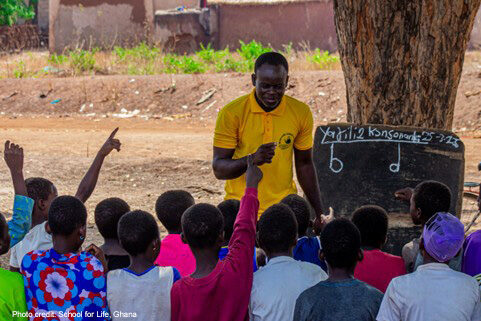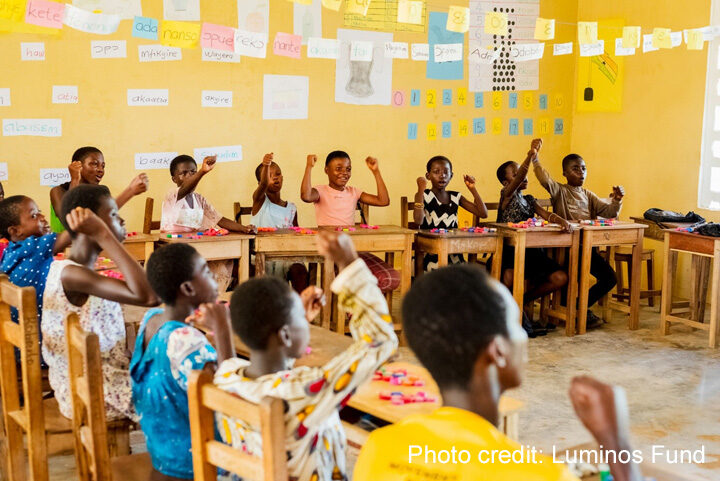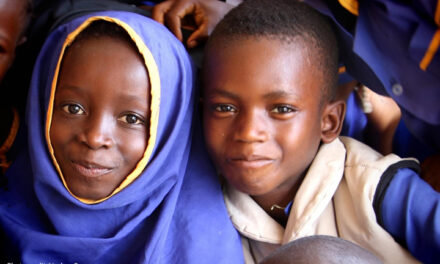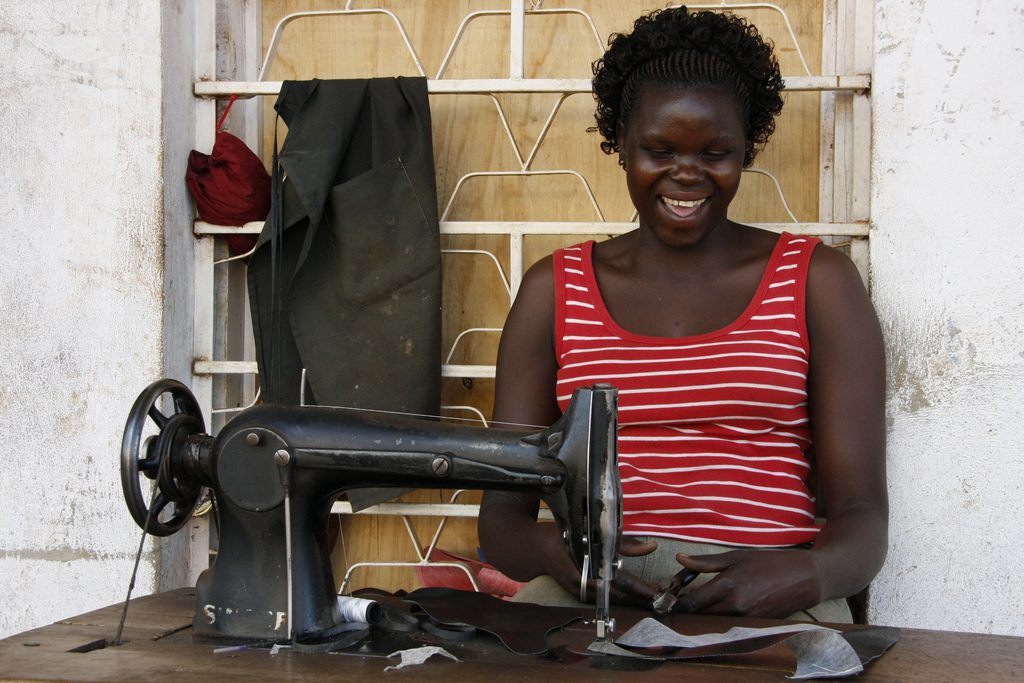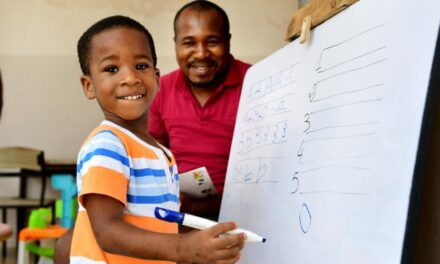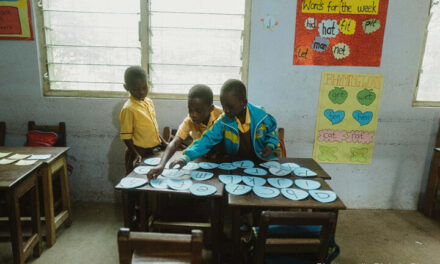This blog was written by Kwame Akyeampong, Professor of International Education and Development at the Open University (OU), UK, and Founder of its Centre for the Study of Global Development (CSGD); and Sean Higgins, Lecturer in Education and International Development at the Institute of Education, University College London.
From deficit to dignity
This blog shares reflections from our new book ‘Reconceptualising the learning crisis in Africa: Multi-dimensional pedagogies of Accelerated Learning Programmes’. For more than a decade, the conversation on education in Africa has been framed by the language of ‘crisis’, particularly the so-called ‘learning crisis’. Whilst there is a real challenge in literacy and numeracy outcomes, a crisis-dominant lens easily drifts into deficit thinking: portraying African children, teachers, and communities as lacking the capabilities to learn or teach.
An Ubuntu lens – grounded in African philosophies of care, compassion and collective responsibility – invites a different starting point. It reframes learners and teachers as knowledge-holders whose identities, languages and community ties are assets, not obstacles. As research across Ethiopia, Liberia and Ghana shows, when education systems honour these assets, learning becomes relational, joyful and transformative. Ubuntu turns attention away from imported toolkits and toward the relationships that make learning possible – between children and teachers, schools and communities and policy and practice.
Relational pedagogies in practice
Accelerated Learning Programs (ALPs) in Ethiopia, Ghana and Liberia illustrate Ubuntu in action. Each began as a response to exclusion – helping children who had dropped out or never attended school to re-enter formal education – and each achieved remarkable reach under tight constraints:
- Ghana’s Complementary Basic Education (CBE) has supported over 250,000 learners, most in rural northern districts.
- Ethiopia’s Speed Schools have reached more than 200,000 out-of-school children by 2017.
- Liberia’s Second Chance program had about 5,000 participants by 2022.
What mattered was not imported materials but relational practice which included:
- Recognising and building on the knowledge and strengths of African children and families.
- Valuing local teachers’ deep knowledge of socio-cultural and economic contexts of their communities and children’s realities to organise participation, use home language strategically and build peer support.
- Community language mapping to ensure teaching began in the language children actually understood.
- Extended use of local languages in instruction (often two to three years longer than national policy required) which deepened comprehension and confidence.
- Employing pedagogical approaches that supported holistic forms of learning, which dignify the agency and identity of the African child and their cultural and material environments.
- Teacher-led, practice-centred support which replaced rigid scripted materials with shared problem-solving and mentoring.
Across settings, these moves connect curriculum goals to the material and cultural worlds of African children and enable deeper, transferable learning across subjects, not just literacy and numeracy. It also restored children’s dignity as capable learners and teachers’ agency as skilled professionals.
Language, identity and belonging
Decades of evidence show that learning in one’s home language for at least six years strengthens literacy, numeracy, motivation and self-esteem. Yet millions of African children still start school in a language that is not their own. Language of instruction is not a technical footnote – it is an equity hinge. When children cannot understand the language used in lesson delivery, they are effectively excluded from learning and from the sense of being legitimate learners.
Language of instruction can act as a gateway to communal engagement in learning, allowing children to bring what they know and experience into the classroom learning environment. As one Ghanaian linguist we interviewed points out: “…a child needs to learn from known to unknown… and from the mother tongue to be able to understand the principles, concepts and value… To use that as a basis to know.”
Instead, African children’s home languages are often trivialised as preparation for immersion in an ex-colonial language, rather than valued for their potential in facilitating meaningful and engaging learning opportunities. By excluding children’s languages, monolingual education policies and the pedagogical and curriculum approaches that result in devaluing their lives and lived experiences. In doing so, they thwart opportunities to draw on their familiar communicative practices to facilitate learning.
The myths concerning mother-tongue education – that there are too many languages, that African languages cannot express complex ideas, that English immersion guarantees fluency – have been disproven repeatedly. The deeper issue could be argued as the fear of the unknown: fear that valuing African languages may threaten national unity or global competitiveness. In truth, linguistic inclusion expands both. When learners hear and use their own languages in school, comprehension rises, participation increases and self-worth grows. Language becomes a bridge to belonging – and belonging is the soil in which learning takes root.
Four practical levers towards relational shifts in practice
Drawing on the book’s twelve guiding principles for a renewed postcolonial agenda to make meaningful progress towards Education For All, we have identified four practical levers can help ministries, teacher educators and development partners act now:
- Map community languages before design: Conduct linguistic mapping so curriculum and materials match children’s real language environments.
- Use local languages more consistently and for longer: Strengthen the implementation of mother-tongue instruction and ensure a more gradual, bilingual transition to the second language.
- Centre classroom practice: Invest in teacher professional communities where educators adapt and co-create lesson resources rather than implement scripted plans.
- Value teachers’ local knowledge: Redesign teacher education to build on teachers’ lived experience and multilingual capability.
These are not costly reforms – they are relational shifts. Each affirms Ubuntu’s ethic of mutual recognition and collective care, repositioning teachers, learners and communities as partners in the educational project.
Recommendations and ways forward
Moving from small pilots to national policy requires breaking with the ‘projectisation’ of reform. Donor-driven toolkits and narrow test-score targets cannot build the institutional capability needed for relational pedagogy to thrive. Ministries can take three steps:
- Institutionalise language-inclusive policy – ensuring every child begins school in a language they understand.
- Embed Ubuntu principles in teacher standards and curriculum frameworks, recognising teaching as a social, ethical practice of care.
- Foster local professional learning networks that connect schools, communities and teacher colleges around shared inquiry.
Development partners can align funding and metrics to these goals – valuing participation, inclusion and teacher agency alongside test outcomes.
A way forward
Ubuntu reminds us that education is relationship before it is measurement. Inclusion and equity are not achieved by more testing but by restoring the human connections that make teaching and learning meaningful. The comparative lessons from Ghana, Ethiopia and Liberia show what is possible when policy begins with language, identity and belonging.

